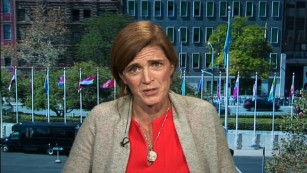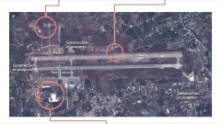Russia sends fighter jets to Syria after talks with U.S.
Defense Secretary Ashton Carter spoke with his Russian counterpart Friday as Russian military moves inside Syria continued to escalate with the arrival of fighter jets.
In a "constructive conversation," both Carter and Russian Defense Minister Sergei Shoygu agreed to "further discuss mechanisms for deconfliction in Syria," Pentagon Press Secretary Peter Cook said in a statement, as the United States and its allies continue military operations against ISIS inside Syria.
Shoygu told Carter that the recent Russian military buildup in Syria is "defensive in nature" and aimed at supporting Russian obligations to the regime of Syrian President Bashar al-Assad, a senior U.S. Defense official told reporters.
The U.S. policy is that Assad, a close ally of Moscow, must leave office in order to resolve the years-long civil war, and U.S. officials have warily watched Russia's military support of the Syrian regime.
However, with U.S. aircraft also operating in the country as America roots out ISIS, it is important that the two powers coordinate their military presence to avoid accidental encounters.
An intelligence official called the Russian buildup in Syria "significant" and said it would represent "the first major expeditionary force deployment" outside the former Soviet space that Moscow has undertaken since the war in Afghanistan.
Reports indicate the military buildup in Syria could consist of combat aircraft that are capable of striking ground targets, providing close air support and intercepting aircraft, and small numbers of main battle tanks and armored personnel carriers to transport troops to the battlefield.

U.S. to Russia: Backing Assad 'not a winning strategy'
Moscow's ultimate intentions are unclear, but initial signs suggest a focus on providing air support to Syrian forces and to humanitarian relief operations. The U.S. also expects Russia to send a small presence of ground forces to support these operations.
The intelligence official added that "a challenge for Russia is maintaining a presence on the ground may require a robust force that could come in direct combat with various forces in the region."
The conversation between Carter and Shoygu seemed to differ somewhat from an earlier call this week between senior U.S. and Russian officials.
On Wednesday, Secretary of State John Kerry said he had spoken with Russian Foreign Minister Sergey Lavrov and was told Russian movements in Syria were being focused toward the battle against ISIS.
"I'm not taking that at face value, because we look at the type of airplanes or the type of munitions and so forth, and it obviously raises much more serious questions about what is happening," Kerry told reporters Wednesday.
Traveling in London on Friday, Kerry said the destruction of ISIS remains the top U.S. priority in Syria, but that the Obama administration was also committed to finding "a political settlement with respect to Syria, which we believe cannot be achieved in the long term presence of Assad."
The calls are the first between the two defense officials since the U.S. suspended military conversations with Moscow in the wake of Russia's annexation of Crimea and involvement inside Ukraine.
READ: Putin becomes a political punching bag in White House race
Despite the calls between Kerry, Carter and their counterparts, State Department Deputy Spokesman Mark Toner maintained on Friday that the communication did not signal a new phase in the relationship, and that high-level contact between the U.S. and Russian military on other matters "still remains on hold."
Officials said the call was initiated at the request of the Russian government, and it raises questions of how imminent any Russian military action in Syria may be.
A U.S. official told CNN Friday that four Russian Sukhoi "Flanker" jets have arrived in Syria. It is unclear how those aircraft will eventually be used in Syria.
Prior to that development, the U.S. had observed eight Russian military helicopters at the airbase in Syria that Russia is beefing up, and seen Russia move tanks, mobile artillery and armored vehicles into the Middle Eastern nation.
The defense official did not rule out future discussions between U.S. and Russian officials on Russian support missions for Assad, even though the U.S. opposes that support.
While it is unclear what the next steps in the U.S.-Russian military relationship may be, the official said further talks would be aimed at trying to "avoid any misunderstanding" in that relationship.
News Courtesy: www.cnn.com











